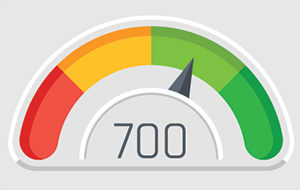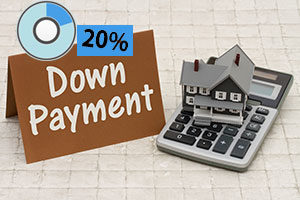Determining if a Jumbo Loan in California is Right for You
If you’re taking steps to purchase your dream home, checking the price tag is one way to determine which type of loan you’re going to need. Most buyers will seek funding through a conventional mortgage or an FHA loan. However, those loans have price caps, which means that the loans can only cover up to a certain price. The Federal Housing Finance Agency set the limit for conventional loans at $453,000. In states like California, where the cost of living is substantially higher, conventional loans may extend to $679,650. If your mortgage amount exceeds that amount, you’ll need to consider applying for a jumbo loan in California.

Finding the right home and financing that meets your budget is an important part of the home buying process for a jumbo loan in California.
If you’re a buyer looking for a jumbo loan in California, you should have at least a working knowledge about this loan type, so you know what level of commitment you will be making.
It’s worth noting that because lenders who offer jumbo loans cannot sell off the mortgage, they create their own rules and qualifying criteria (as noted below). While the information below provides a general overview of jumbo mortgage loans in California, you should always speak with your lender to find out any additional information about how they determine eligibility.
Qualifying for the Best Jumbo Loan in California
Jumbo loans are not covered by Fannie Mae or Freddie Mac because the amount is more than the approved cap determined by FHFA. Because lenders aren’t protected by the two largest buyers of mortgages, qualifying is going to be more difficult than a conventional purchase.

700 may be the credit score you need to qualify for a jumbo loan in California.
Typically, lenders will look at the qualifications for a conventional loan and add more rules and requirements, so jumbo loans in California will have more restrictions than traditional loans. The best things you can do to make sure you qualify for this type of loan are to reduce your debt to income ratio, make payments on time, and save up for a down payment.
If you want to qualify for the best jumbo loans in California: get your credit score in order. You’ll likely need a score of at least 700 to qualify.
Jumbo Mortgage Loans in California May Have Higher Interest Rates
Because jumbo loans don’t conform to the standards set by Fannie Mae and Freddie Mac, lenders often charge a higher interest rate. However, this isn’t always true. You’ll want to chat with your lender to see what type of interest rates they have on their best jumbo loans.
Jumbo Loans in California Require a Higher Down Payment

To qualify for a jumbo loan in California a down payment of 10-30% is often required.
Lenders usually have stricter requirements for a down payment. On average, lenders will ask for somewhere between 10 and 20 percent, though some lenders may ask for as much as 30 percent down payment for jumbo mortgage loans in California.
Lenders who do allow for a lower down payment may offset that with a higher interest rate or other income restrictions.
Note: Most conforming loans require that borrowers have at least 20 percent down on their property to avoid paying for private mortgage insurance. That may not always be true with a jumbo loan. As lenders have more leeway over repayment terms for jumbo mortgages, some lenders are willing to skip the PMI requirement.
Lenders May Have Home Eligibility Requirements
Depending on the type of jumbo loan you get, and your lender, you may only be able to get a jumbo loan for your place of residence. Also, some lenders won’t provide jumbo loan financing on foreclosed homes or short sale properties. Before you start house hunting, please make sure you chat with your lender to find out what rules they have.
Unique Requirements of a Jumbo Loan in California
Depending on the size of your California jumbo loan, your property may need to undergo two appraisals. When

The approval process for jumbo loans in California may be a little different than an traditional mortgage.
lenders are offering a half-million dollars or more, they want to make doubly sure the investment is secure.
A jumbo loan requires a serious commitment and good credit. However, this type of loan can make it much easier for you to finance the home of your dreams. Be sure to call us with your unanswered questions, we’re happy to help you determine whether a jumbo mortgage loan is the best option for you!
The Secure Choice Home Loan team has been helping customers since 1984. We know that each jumbo loan client has unique needs and we help them find financing that fits their circumstances. Whether you’re interested in a jumbo loan in California or need help securing other types of residential financing including an FHA mortgage, traditional mortgage, ARM or alternative funding, we can help you prepare. If you have any questions or want to see if you’re ready for the next step in funding your new home, give us a call us today at 1- 866-724-8858.
Get a FREE No-Obligation Consultation



Self-Employed Mortgages & Alternative Home Financing Options
/in Alternative Home Financing, Self Employed Mortgages/by Ron MorilloQualifying for Self-Employed Mortgages
Obtaining funding to purchase property, whether it’s a home for your family, or a plot to flip and sell, should be a straightforward process for people who have access to income or a lump sum of money to help fund the purchase. Unfortunately, standards set by Fannie Mae and Freddie Mac can make it difficult for some buyers to get the
Qualifying for self-employed mortgages is tougher through Fannie Mae and Freddie Mac. Secure Choice Home Loans has alternative home financing programs that can help you purchase or refinance your home.
funding they need.
Individuals who may otherwise qualify could struggle to meet the standards set by Fannie Mae and Freddie Mac, particularly those who are self-employed, have a lower monthly income, or have a low credit score.
Fannie Mae, Freddie Mac and Conforming Loans
Fannie Mae and Freddie Mac are the two largest purchasers of home mortgages in the United States. Lenders sell loans to Fannie Mae and Freddie Mac to get liquid funds that allow them to make additional loans. Fannie Mae and Freddie Mac either hang onto the loans or package them into mortgage-backed securities and sell them to investors. Because these two organizations make massive investments with thousands of banks, they have set specific standards for loans they are willing to purchase. Loans that meet these standards are called conforming loans.
To qualify for a conforming loan a borrower must:
Fortunately, some lenders noticed gaps in the system, and they offer programs that make it easier for buyers to access the funds they need to purchase a property.
Self-Employed Mortgages & Loans
If you’re self-employed, you know that your monthly income can vary widely from one year to the next, but because
To qualify for self-employed mortgages in California you may want to maximize your reported earnings as much as possible.
most lenders average your past two to three years of income, you could miss out on getting the right loan, based on revenue from several years ago. The self-employed mortgage loan fits in a group of niche loans that target specific groups of borrowers. Lenders who offer this type of mortgage may ask for your tax returns (sometimes just one year instead of two), a profit and loss statement, a copy of your business license, letters from your clients and any other documentation that details your self-employment information.
Note: Lenders look at your tax returns to determine your income. You may have deducted certain expenses on your taxes, this reduces your overall income because lenders look at the total after costs deducted by the government. If you are planning to apply for a self-employed mortgage loan in the next year or two, consider writing off less on your taxes, and make sure your business funds are separate from your personal funds.
Being self-employed comes with risks. Sometimes that first year or two can be a struggle financially. Maybe you had trouble paying some bills, while you built your business. If your credit score is still struggling, you may not qualify for a conforming loan. However, you may be able to get a low credit score mortgage loan.
An FHA loan can be an excellent way to qualify for a low credit score mortgage if you have less than perfect credit. Secure Choice Home Loans has helped many low credit score borrowers qualify for FHA home loans.
Low Credit Score Mortgage Loan
One type of low-credit score mortgage loan is the FHA loan. An FHA loan allows borrowers with scores in the 500s to qualify for loans. You may have to pay a slightly higher interest rate and private mortgage insurance, but you could get into the property you want without having to meet the more stringent debt to income or credit score requirements set by Fannie Mae and Freddie Mac.
Interest-Only Mortgage
An interest-only mortgage allows buyers to purchase a property and only make the interest payments on the mortgage for a set amount of time. The benefit of this type of loan is that it provides an initial period where the payment is much lower. After the set time, the monthly payment increases to the amortized amount (balance plus interest rate). This can be beneficial for self-employed individuals who anticipate that their income will rise during the time the property is under the interest-only payment period. Note: Buyers don’t have to pay an interest-only payment during this time, but they can. So, if your business has a hard month, you could opt to make a lower amount to help balance your budget with less income. You can expect to see slightly higher interest rates on this type of loan.
Secure Choice Home Loans offers several alternative home loan options for borrowers including higher debt-to-income ratio and asset depletion mortgages.
Other Types of Alternative Home Financing Options
There are plenty of funding options that don’t fit within the parameters of a conforming loan. Borrowers may consider an Expanded DTI mortgage which allows for a higher debt to income ratio than a conforming loan (sometimes as high as 80 percent or more) and an Asset Depletion Income mortgage which factors in a borrower’s assets (like a large savings account) instead of monthly income.
If you’re struggling to qualify for a conforming loan, give us a call. We may have a program that will help you get the property of your dreams and get you on the path to home ownership. We’re happy to answer any questions you have and provide more details about the different options that may fit your needs.
Get a FREE No-Obligation Consultation
Getting a Jumbo Loan in California: 5 Things You Need to Know
/in Jumbo Loans/by Ron MorilloDetermining if a Jumbo Loan in California is Right for You
If you’re taking steps to purchase your dream home, checking the price tag is one way to determine which type of loan you’re going to need. Most buyers will seek funding through a conventional mortgage or an FHA loan. However, those loans have price caps, which means that the loans can only cover up to a certain price. The Federal Housing Finance Agency set the limit for conventional loans at $453,000. In states like California, where the cost of living is substantially higher, conventional loans may extend to $679,650. If your mortgage amount exceeds that amount, you’ll need to consider applying for a jumbo loan in California.
Finding the right home and financing that meets your budget is an important part of the home buying process for a jumbo loan in California.
If you’re a buyer looking for a jumbo loan in California, you should have at least a working knowledge about this loan type, so you know what level of commitment you will be making.
It’s worth noting that because lenders who offer jumbo loans cannot sell off the mortgage, they create their own rules and qualifying criteria (as noted below). While the information below provides a general overview of jumbo mortgage loans in California, you should always speak with your lender to find out any additional information about how they determine eligibility.
Qualifying for the Best Jumbo Loan in California
Jumbo loans are not covered by Fannie Mae or Freddie Mac because the amount is more than the approved cap determined by FHFA. Because lenders aren’t protected by the two largest buyers of mortgages, qualifying is going to be more difficult than a conventional purchase.
700 may be the credit score you need to qualify for a jumbo loan in California.
Typically, lenders will look at the qualifications for a conventional loan and add more rules and requirements, so jumbo loans in California will have more restrictions than traditional loans. The best things you can do to make sure you qualify for this type of loan are to reduce your debt to income ratio, make payments on time, and save up for a down payment.
If you want to qualify for the best jumbo loans in California: get your credit score in order. You’ll likely need a score of at least 700 to qualify.
Jumbo Mortgage Loans in California May Have Higher Interest Rates
Because jumbo loans don’t conform to the standards set by Fannie Mae and Freddie Mac, lenders often charge a higher interest rate. However, this isn’t always true. You’ll want to chat with your lender to see what type of interest rates they have on their best jumbo loans.
Jumbo Loans in California Require a Higher Down Payment
To qualify for a jumbo loan in California a down payment of 10-30% is often required.
Lenders usually have stricter requirements for a down payment. On average, lenders will ask for somewhere between 10 and 20 percent, though some lenders may ask for as much as 30 percent down payment for jumbo mortgage loans in California.
Lenders who do allow for a lower down payment may offset that with a higher interest rate or other income restrictions.
Note: Most conforming loans require that borrowers have at least 20 percent down on their property to avoid paying for private mortgage insurance. That may not always be true with a jumbo loan. As lenders have more leeway over repayment terms for jumbo mortgages, some lenders are willing to skip the PMI requirement.
Lenders May Have Home Eligibility Requirements
Depending on the type of jumbo loan you get, and your lender, you may only be able to get a jumbo loan for your place of residence. Also, some lenders won’t provide jumbo loan financing on foreclosed homes or short sale properties. Before you start house hunting, please make sure you chat with your lender to find out what rules they have.
Unique Requirements of a Jumbo Loan in California
Depending on the size of your California jumbo loan, your property may need to undergo two appraisals. When
The approval process for jumbo loans in California may be a little different than an traditional mortgage.
lenders are offering a half-million dollars or more, they want to make doubly sure the investment is secure.
A jumbo loan requires a serious commitment and good credit. However, this type of loan can make it much easier for you to finance the home of your dreams. Be sure to call us with your unanswered questions, we’re happy to help you determine whether a jumbo mortgage loan is the best option for you!
The Secure Choice Home Loan team has been helping customers since 1984. We know that each jumbo loan client has unique needs and we help them find financing that fits their circumstances. Whether you’re interested in a jumbo loan in California or need help securing other types of residential financing including an FHA mortgage, traditional mortgage, ARM or alternative funding, we can help you prepare. If you have any questions or want to see if you’re ready for the next step in funding your new home, give us a call us today at 1- 866-724-8858.
Get a FREE No-Obligation Consultation
7 Steps to Creating a Good First Time Home Buying Experience
/in Home Buying/by Ron MorilloWe recently read a good article about steps to creating a good first-time home buying experience that we found in Southern California’s Valley News and wanted to share the key points with you:
Read more
Mortgage Applications & Refinances Drop
/in Mortgage Loans/by Ron MorilloAccording to this week’s Mortgage Bankers Association’s survey, home purchases and mortgage applications have dropped. Home purchases dropped down approximately 1%, mortgage applications down about 6.2% and refinances fell by 10%.
Read more